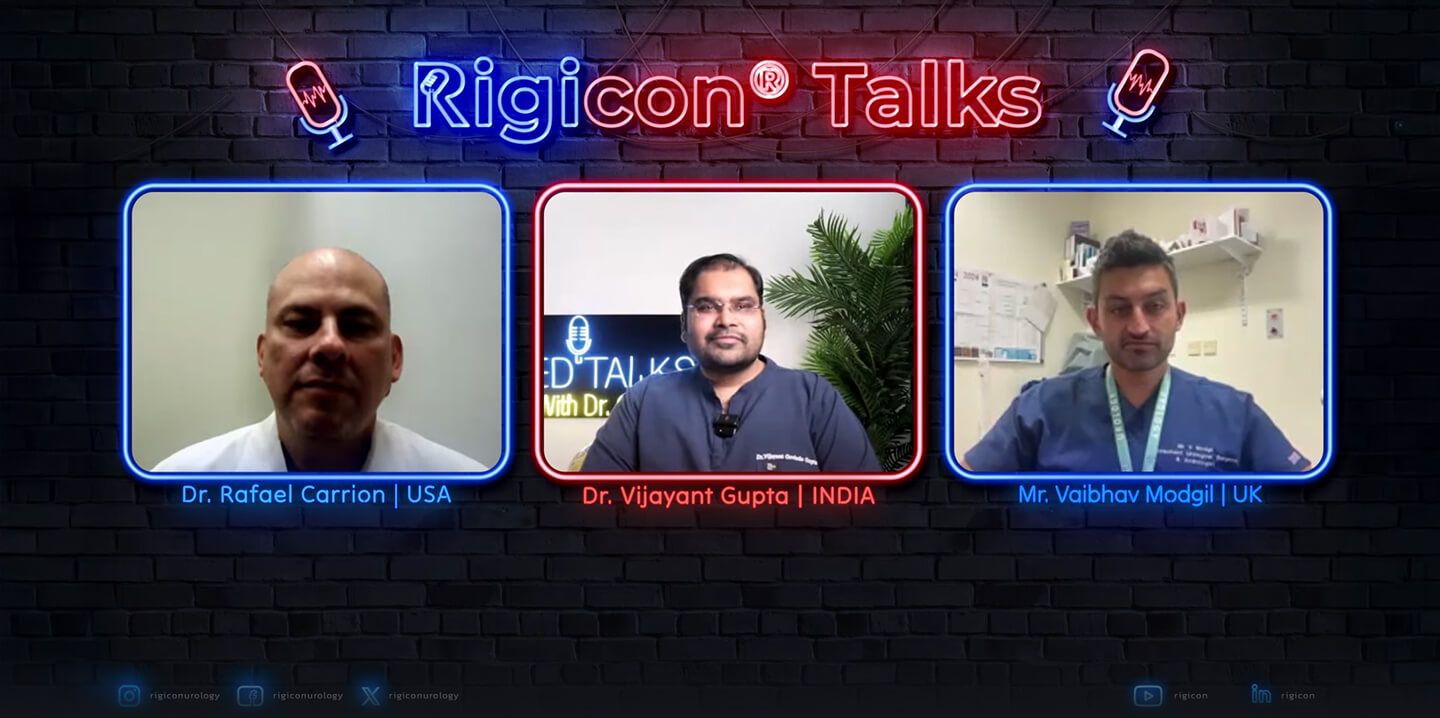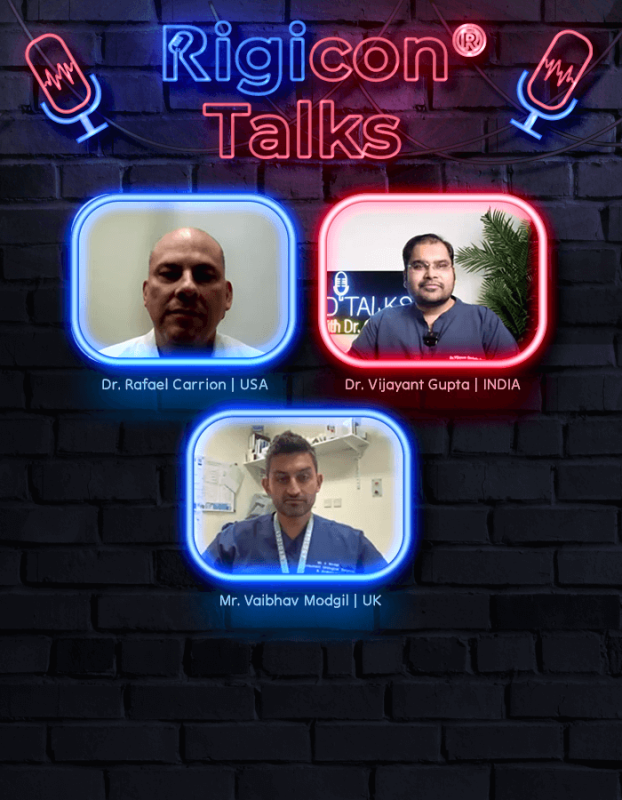Penile implants are a well-established treatment for erectile dysfunction (ED), yet misconceptions still surround the procedure. Many men hesitate to consider this option due to misinformation about eligibility, effectiveness, and recovery.
In this expert discussion from Rigicon Talks – Session 3, top urologists Dr. Rafael Carrion, Dr. Vijayant Gupta, and Mr. VB Modgil break down common myths and facts about penile implants. These specialists, with years of experience in sexual medicine and implant surgeries, provide evidence-based insights to help men make informed decisions.
Common Myths and Facts About Penile Implants
1. Myth: Penile Implants Are Only for Older Men
While erectile dysfunction is more common in older men due to health conditions like diabetes, high cholesterol, and obesity, younger men can also suffer from severe ED. The truth is that ED is not just an “old man’s disease.” Many men in their 30s and 40s experience ED due to organic or psychological factors.
- Age is not a determining factor – ED can affect men of all ages, and implants are an option for any adult man.
- Penile implants are suitable for younger men – Especially those who do not respond to medications or other treatments.
- Decision-making should be patient-centered – Considering all available ED treatments before choosing an implant.
2. Myth: Penile Implant Surgery Is Only for Severe ED Cases
Men don’t need to wait until complete erectile failure to consider a penile implant. Early intervention often yields better results for several important reasons:
- Waiting too long can lead to size loss – Due to penile fibrosis from extended periods without regular erections.
- Moderate ED cases benefit from implants – When medications or injections fail to provide consistent results.
- Improved sexual function and confidence – Major benefits that shouldn’t be delayed unnecessarily.
If ED affects your quality of life and other treatments fail, an implant is a valid option—even before reaching total erectile failure.
3. Myth: Penile Implant Surgery Requires a Long Hospital Stay
Modern penile implant surgeries are minimally invasive, with many patients returning home the same day or within 24–36 hours. Here’s what to expect:
- Surgery duration: Approximately 1 hour
- Hospital stay: 0–1 night, depending on individual recovery
- Full healing: 4–6 weeks before resuming sexual activity
This is primarily an outpatient procedure in most cases—lengthy hospital stays are not required.
4. Myth: Penile Implants Make the Penis Shorter
Penile implants do not shrink the penis, but rather fit inside the paired cavernous bodies to provide rigidity. Here’s what you should know about size concerns:
- Some men experience perceived shortening if they have long-term ED, as lack of erections can cause penile atrophy.
- Expert urologists ensure proper sizing of the implant to maximize natural length.
5. Myth: Penile Implants Feel Artificial and Unnatural
Today’s three-piece inflatable penile prostheses provide the most natural-looking and functional results available for ED treatment. Here’s how they work:
- The implant is completely internal—nothing is visible outside the body.
- The pump in the scrotum allows for an erection on demand.
- Most men and their partners report high satisfaction rates (>90% in studies).
A penile implant functions naturally, restoring spontaneity and confidence.
6. Myth: Penile Implant Surgery Is Extremely Painful
While some discomfort is expected after any surgical procedure, pain from penile implant surgery is manageable and temporary:
- 🩺 Mild to moderate pain is expected in the first few weeks
- 💊 Prescription pain relievers are provided for post-op comfort
- ⏱️ Most patients report significant pain reduction within 2–4 weeks
Post-operative discomfort is temporary, and most men recover well within a few weeks.
7. Myth: You Cannot Ejaculate or Orgasm After a Penile Implant
This is one of the most common misconceptions about penile implants. The truth is that sexual function remains largely intact:
- A penile implant only restores erection function—it does not affect nerves responsible for orgasm.
- Men can still ejaculate and experience pleasure as they did before surgery.
- Sensation in the penis remains unchanged after implant surgery.
“The implant addresses the mechanical aspect of erections without interfering with the sensory experience of sex.”
8. Myth: Penile Implants Are Prone to Malfunctions
Modern implant technology has significantly improved reliability and durability:
- Success rates are 90–95% for implant surgeries.
- Most implants last 10–15 years or longer before needing replacement.
- Newer models have lower mechanical failure rates than earlier versions.
Implants are a long-term solution with high patient satisfaction and reliability.
Final Thoughts: Is a Penile Implant Right for You?
Penile implants offer a permanent and highly effective solution for men suffering from erectile dysfunction. Despite lingering myths, scientific evidence and expert insights confirm their safety, reliability, and satisfaction rates.
“When properly selected and performed by experienced surgeons, penile implant surgery has one of the highest satisfaction rates of any procedure in urology.”
Considering a penile implant? Here are the key takeaways from our expert panel:
Frequently Asked Questions (FAQs)
How long does it take to recover from penile implant surgery?
Most men recover within 4–6 weeks and can resume sexual activity afterward. Your surgeon will provide specific guidelines based on your individual healing process.
Will my partner be able to tell I have an implant?
No—the implant is entirely internal and not visible externally. Most partners cannot detect the presence of an implant during intimacy.
Can I still have children with a penile implant?
Yes! The implant does not affect fertility or ejaculation. It only addresses the mechanical aspect of achieving an erection.
All trademarks, registered marks (® and ™), and product names mentioned in this article are the property of their respective owners. The use of such marks does not imply any affiliation with or endorsement by them. This content is for informational purposes only and should not replace professional medical advice. Always consult with a qualified healthcare provider before making any decisions regarding your health.






